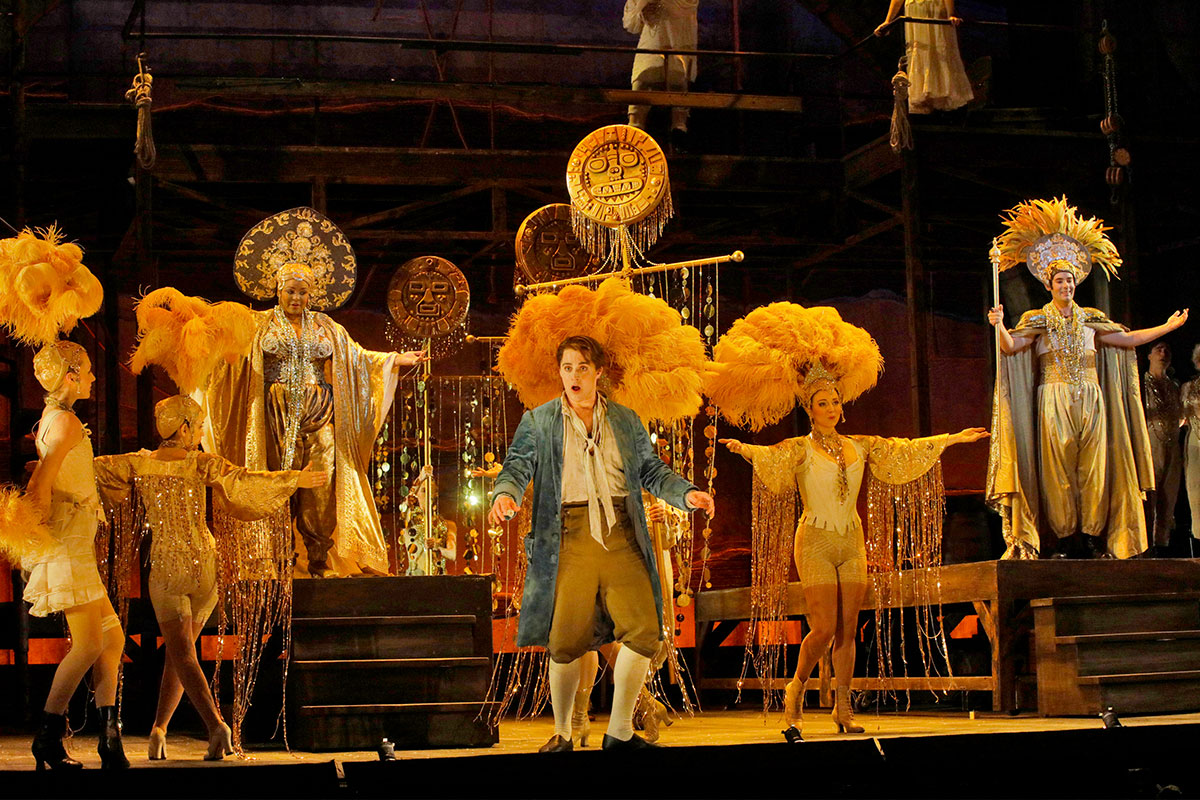LA Opera’s ‘Candide’ is hilarious, yet heartfelt

Jack Swanson, who plays the titular character Candide, dazzles in his debut performance at the LA Opera, balancing the play’s emotional moments with those that are more light-hearted. Photo courtesy of Ken Howard
The closing curtsies of the cast of Candide, an English-language operetta with music by Leonard Bernstein and lyrics by Richard Wilbur, were met with thunderous applause on opening night. With a revised libretto by John Caird based on the 1759 satirical novel by the French philosopher Voltaire, Candide stars Jack Swanson in the title role, five-time Emmy Award winning actor Kelsey Grammer in the dual role of Voltaire and Dr. Pangloss and Erin Morley as leading lady Cunegonde. All three leads made their LA Opera debuts in the two-hour and thirty-minute production, directed by Francesca Zambello and conducted by James Conlon.
Voltaire, the narrator, pokes fun at the Leibniz philosophy that this is “the best of all possible worlds” and harbors an optimistic worldview due to Dr. Pangloss’ teachings. Believing everything to be simply the best possible scenario, Candide grows to be a kind-hearted man and falls in love with Cunegonde, a baron’s daughter. Simple-minded and materialistic, Cunegonde imagines a much more luxurious marriage with Candide. As the couple endures tragedy after tragedy, they must face the reality that this might actually be “the worst of all possible worlds” in the song “Words, Words, Words.”
The show-stopping number occurs in Act One, when Cunegonde mourns the loss of her innocence while revelling in her newfound riches in the coloratura aria “Glitter and Be Gay.” Although it is one of the most difficult soprano pieces to perform, Morley hit every note perfectly while dancing wildly and even lying down at one point.
This song encompasses the bittersweet, satirical nature of the operetta as Cunegonde switches quickly from laughing to crying, from gloating about her sapphire jewelry to lamenting her ruined life. Candide, too, grows weary of the meaning of all the troubles he’s endured to reunite with his love in “Nothing More Than This.” Later, Candide and Cunegonde’s worldview is tinged with a spark of hope as they admit “We’re neither pure, nor wise, nor good [but] we’ll do the best we know” in “Make Our Garden Grow (Finale).”
The operetta combines the utopian philosophy of optimism with the imaginative, ironic and intense story-within-a-story plot of Man of La Mancha. After all, the musical production includes the original novelist as a main character, drawing attention to the dichotomy between Pangloss’s proposed philosophy and the harsher, realistic ending Voltaire imagined.
Overall, Candide brings a whirlwind of emotion in the crazy, disastrous yet delightful lives of Candide and Cunegonde. Characters appear to die and later come back to life, and there are a great many serendipitous reunions while Pangloss’ students ultimately reject his philosophy. Sweet-faced Swanson had the audience rooting for him to keep his faith in the goodness of others and the perfection of the world, while Grammer, on the other hand, had the audience members laughing, cheering and whistling until the very end, when the entire cast and ensemble received a well-earned standing ovation.
This production of Candide, co-produced by The Glimmerglass Festival, Opéra National de Bordeaux and Théatre du Capitole de Toulouse, will be performed at LA Opera’s Dorothy Chandler Pavilion in downtown Los Angeles with projected lyrics on five select dates until Feb. 18. Tickets range from $44 to $349.
